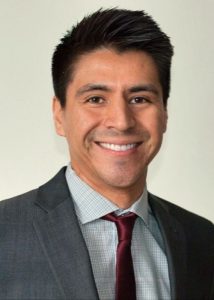 By Eric Howard
By Eric Howard
I was four years old when I became an American citizen. Those first few months were a lot to take in; I remember navigating feelings of confusion, fear, and doubt. I was an adoptee from Mexico with a new family in a new country having to learn a new language.
It was also a lot to take in for the American family that raised me. Making room for a new family member is no small endeavor. I can’t describe the depth of energy it took my family to navigate our immigration system and to finalize the adoption of (eventually) three children. It couldn’t have happened, though, without infinite determination, compassion, generosity, and a commitment to go through tough times.
These are American family values. I turn to them when I hear the immigration debate play out on television, on the streets, and in pews across denominations. Woven into the debate is the sanctuary movement and stories of churches and cities across the country taking part in this powerful call to action.
AS A CITIZEN, my perspective on “sanctuary” for a refugee family is woefully limited. I cannot imagine the depth and range of emotion immigrant parents feel every second in this time of great uncertainty.
Adoption, though, offers clarity on how radical hospitality can look when you not only see but also embrace a new family as your own. I received countless messages of belonging, and I was told repeatedly that there was always room in the family.
This is what came to mind when the ELCA took a historic step to become a sanctuary church body at its 2019 Churchwide Assembly. (Bishop Ann Svennungsen has offered some reflections the meaning of this action).
“I turn to American family values when I hear the immigration debate play out on television, on the streets, and in pews across denominations.”
Through my experience and family values, I see the memorial as a reignited call for three things as individuals and church communities:
- First: Don’t just see, radically embrace, all families as our own, especially those vulnerable to deportation. I hope that, through our different expressions of hospitality, we will approach the unknown people from a perspective of the family values of compassion, generosity, and a commitment to hospitality.
- Second: Lean into uncomfortable conversations; ask curious questions. I get it; leaning into tension can be tough. Most of us are not experts and many of us may feel underprepared to take new, meaningful steps to support migrants in this sanctuary movement. My question is always this: If we can’t have tough conversations in our faith community, where else can we have them?
- Third: Stay engaged; refrain from indifference. The ELCA memorial called for strategies and practical tools for education and discernment in the coming years. Staying engaged with your energy, prayers, and imagination is so important to make sure this action feels genuine for your people in your setting.
Lutherans are now fueling a movement that people of faith have been engaged in for decades, and we are rekindling a fire sparked at the 2016 Churchwide Assembly when we adopted the Strategy to Accompany Migrant Minors with Protection, Advocacy, Representation and Opportunities (AMMPARO). Embrace this moment with infinite determination, compassion, and generosity.
